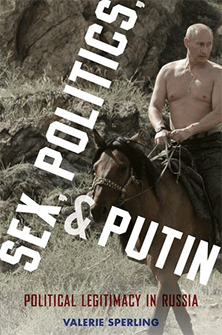By Benjamin Franklin Martin
Since 1999, Vladimir Putin has led Russia either as prime minister (1999-2000, 2008-12) or as president (2000-08, 2012—), imposing an authoritarian rule on a nation that since the collapse of the Soviet Union in 1991 is nominally democratic. Valerie Sperling argues that Putin’s adoption of “patriarchy” has been the critical element in his political legitimacy, presenting himself as the virile national hero who reasserts traditional values while resisting “alien” influences.
The Soviet Union was a superpower and a paradigm. Without, it projected might around the world and exercised dominion over an eastern European empire. Within, its security apparatus imposed a political, economic, and social Communist conformity. The new Russia intimidated no one, and the eastern Europeans raced to join NATO and the EU. The new Russia had no conformity, and seemingly no rules, as its population experimented with free elections, free markets, free thoughts, and free actions. The common denominator for both was the lure of Western individualism.
For the last decade and a half, Putin has proclaimed his intention to recapture at least some of the clout once wielded by the Soviet Union. In redress, he has fought civil war in Chechnya, embarked on military adventurism in Georgia and Ukraine, and used immense oil and gas reserves to bully his neighbors economically. His social policies, often in alliance with the Russian Orthodox Church, emphasize organic hierarchy at the expense of individual liberties.
Sperling interprets Putin through the prism of feminist theory. He has, she insists, portrayed himself as the knight on the charger who slays the dragon and rescues the maiden. He appears in photographs riding a Harley-Davidson motorcycle, shooting a Siberian tiger (with a tranquilizing dart), flying in a firefighting helicopter, and demonstrating martial arts skills. For him, Russian women tear their tops—“Rip It For Putin!”—or pose in degrees of nakedness for calendars or proclaim their desire to be his next wife. Conversely, his opponents, whether foreign or domestic, must be unmanly, frequently denigrated as “homosexual.”
Inevitably, machismo leads to misogyny, with women reduced to subordinate roles. Inevitably as well, this “hegemonic masculinity” leaves no room for any deviation from traditional sexual conduct. When Putin’s opponents demonstrate for “rights”—especially Pussy Riot’s March 2012 “punk prayer” in Moscow’s Cathedral of Christ the Savior—they confirm his warning about the danger from “Western” influences. Sperling finds nothing to praise in Vladimir Putin and condemns without reprieve the sexualized politics he has sponsored, but her book provides ample evidence of how shrewdly he has capitalized on his politicized masculinity.
Benjamin Franklin Martin (ΦΒΚ, Davidson College, 1969) is the Price Professor of History at Louisiana State University and a resident member of the Beta of Louisiana Chapter of Phi Beta Kappa.




